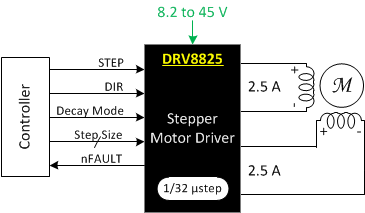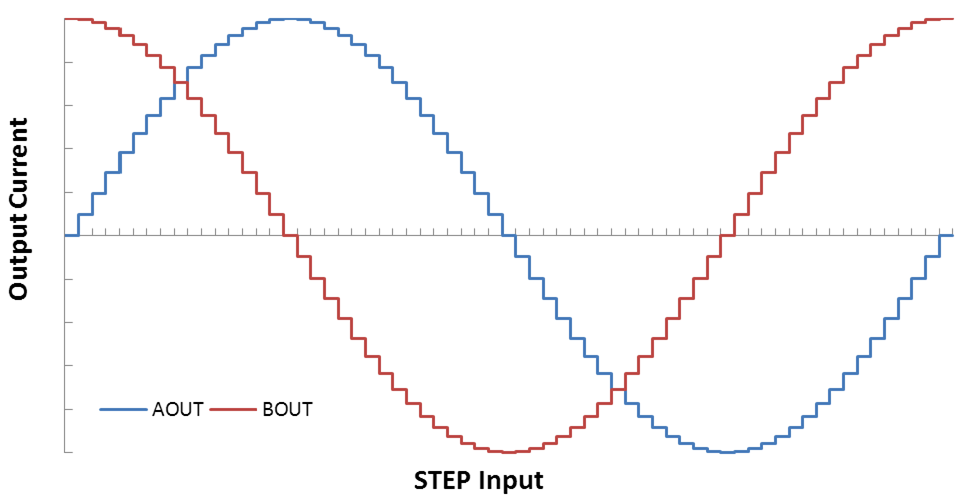SLVSA73F April 2010 – July 2014 DRV8825
PRODUCTION DATA.
- 1 Features
- 2 Applications
- 3 Description
- 4 Simplified Schematic
- 5 Revision History
- 6 Pin Configuration and Functions
- 7 Specifications
- 8 Detailed Description
- 9 Application and Implementation
- 10Power Supply Recommendations
- 11Layout
- 12Device and Documentation Support
- 13Mechanical, Packaging, and Orderable Information
Package Options
Mechanical Data (Package|Pins)
- PWP|28
Thermal pad, mechanical data (Package|Pins)
- PWP|28
Orderable Information
1 Features
-
PWM Microstepping Stepper Motor Driver
- Built-In Microstepping Indexer
- Up to 1/32 Microstepping
- Multiple Decay Modes
- Mixed Decay
- Slow Decay
- Fast Decay
- 8.2-V to 45-V Operating Supply Voltage Range
- 2.5-A Maximum Drive Current at 24 V and
TA = 25°C - Simple STEP/DIR Interface
- Low Current Sleep Mode
- Built-In 3.3-V Reference Output
- Small Package and Footprint
- Protection Features
- Overcurrent Protection (OCP)
- Thermal Shutdown (TSD)
- VM Undervoltage Lockout (UVLO)
- Fault Condition Indication Pin (nFAULT)
2 Applications
- Automatic Teller Machines
- Money Handling Machines
- Video Security Cameras
- Printers
- Scanners
- Office Automation Machines
- Gaming Machines
- Factory Automation
- Robotics
3 Description
The DRV8825 provides an integrated motor driver solution for printers, scanners, and other automated equipment applications. The device has two H-bridge drivers and a microstepping indexer, and is intended to drive a bipolar stepper motor. The output driver block consists of N-channel power MOSFET’s configured as full H-bridges to drive the motor windings. The DRV8825 is capable of driving up to 2.5 A of current from each output (with proper heat sinking, at 24 V and 25°C).
A simple STEP/DIR interface allows easy interfacing to controller circuits. Mode pins allow for configuration of the motor in full-step up to 1/32-step modes. Decay mode is configurable so that slow decay, fast decay, or mixed decay can be used. A low-power sleep mode is provided which shuts down internal circuitry to achieve very low quiescent current draw. This sleep mode can be set using a dedicated nSLEEP pin.
Internal shutdown functions are provided for overcurrent, short circuit, under voltage lockout and over temperature. Fault conditions are indicated via the nFAULT pin.
Device Information(1)
| PART NUMBER | PACKAGE | BODY SIZE (NOM) |
|---|---|---|
| DRV8825 | HTSSOP (28) | 9.70 mm × 6.40 mm |
- For all available packages, see the orderable addendum at the end of the data sheet.
4 Simplified Schematic

Microstepping Current Waveform
